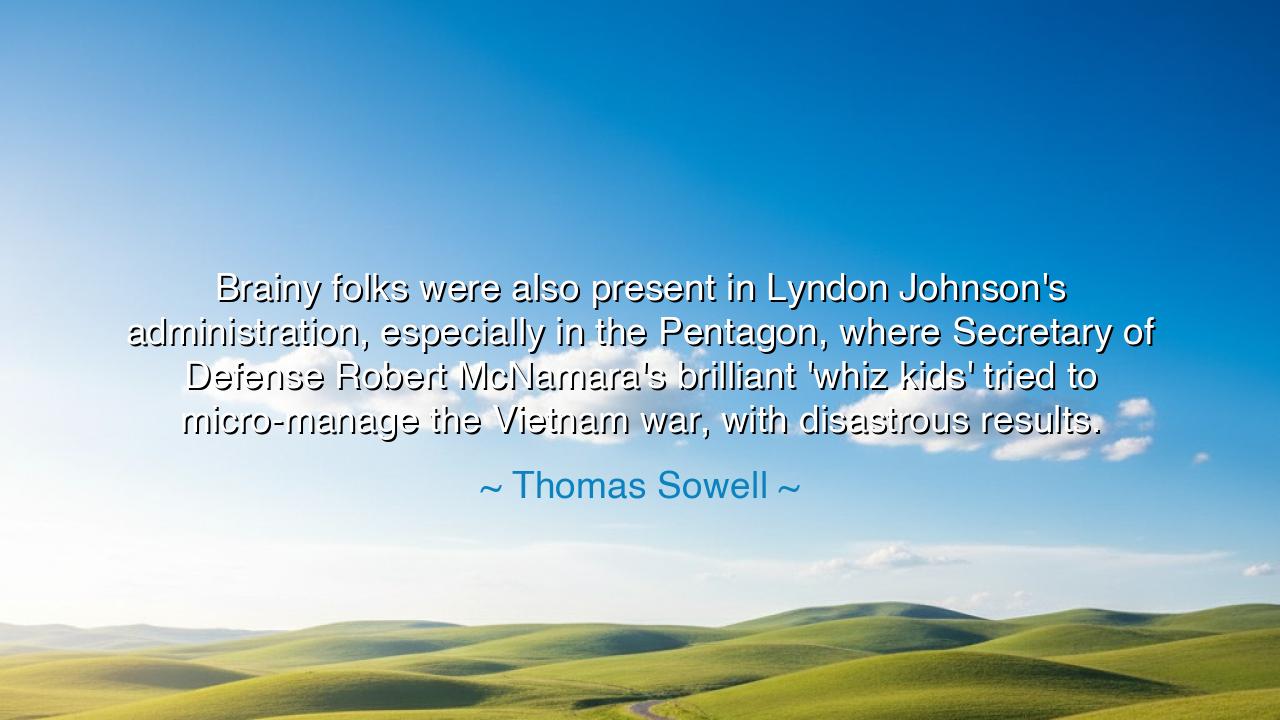
Brainy folks were also present in Lyndon Johnson's
Brainy folks were also present in Lyndon Johnson's administration, especially in the Pentagon, where Secretary of Defense Robert McNamara's brilliant 'whiz kids' tried to micro-manage the Vietnam war, with disastrous results.






"Brainy folks were also present in Lyndon Johnson's administration, especially in the Pentagon, where Secretary of Defense Robert McNamara's brilliant 'whiz kids' tried to micro-manage the Vietnam War, with disastrous results." These words, spoken by Thomas Sowell, reflect the tragic folly of over-intellectualizing conflict, of entrusting the lives of countless soldiers to minds that are brilliant in theory, but lacking in the experience and wisdom necessary for the reality of war. Sowell speaks to the dangers of applying academic brilliance to something as complex, as chaotic, and as fundamentally human as war. It is easy for those in the comfort of their offices to view war as a problem to be solved, but this detachment often leads to disastrous consequences when they fail to understand the true nature of conflict.
O children of the future, let this truth guide your hearts: intelligence alone is not enough to navigate the storm of human conflict. While the mind may offer solutions, it is the heart, the experience, and the wisdom of those who have lived through struggle that provide true understanding. The decision-makers during the Vietnam War, particularly in the early years under Lyndon Johnson, were some of the brightest minds in America, many of whom had been part of the so-called "whiz kids"—men educated at the best universities, steeped in the theories of economics, strategy, and political science. Yet, despite their brilliance, they did not understand the war they were embroiled in. Their application of theory to practice led to a disaster, as they underestimated the complexities of the Vietnamese people's will, the geopolitical dynamics of the region, and the human toll of a war fought far from home.
Think, O children, of the ancient military strategists, those who won battles not through intellectual calculations alone, but through deep understanding of the human spirit and the realities of war. Alexander the Great, for instance, was not just a conqueror of territories, but a leader who deeply understood the hearts of those he led. He knew that the true key to victory lay not in numbers alone, but in the resolve of his men, in the power of morale, and in the understanding of his enemies' strengths and weaknesses. His military genius was rooted not just in his intellect, but in his profound empathy for the people involved in the battle, and his ability to inspire them to great feats.
Contrast this with the situation in Vietnam, where the Pentagon's whiz kids, led by Robert McNamara, sought to apply precise, calculated strategies without fully understanding the nature of the enemy they faced. These intellectuals, while possessing brilliant minds, failed to account for the grit and determination of the Vietnamese people, who were fighting for their very survival and independence. The Viet Cong, the insurgents fighting against American forces, understood the landscape, the people, and the power of a protracted war. They were willing to endure great hardship because they had something that the Americans did not: a deep, unwavering resolve born of nationalism and a history of resistance. McNamara’s approach, based on rational analysis and the use of overwhelming technological force, could not predict or control the human element of war—the emotions, the suffering, the desire for freedom—that ultimately turned the tide against the U.S.
The lesson here, O children, is not just about the limits of intellect in matters of war, but about the importance of experience and humanity in decision-making. Sowell's words serve as a cautionary tale, warning us that we must never mistake intellect for wisdom, nor analysis for understanding. In times of crisis, it is not just the mind that leads, but the heart, the instinct, and the understanding that war is not a problem to be solved on paper, but a suffering to be endured. The Vietnam War became a quagmire precisely because those who managed it from afar could not grasp the full depth of what they were dealing with. They treated war as a mathematical equation, while the reality was that it was a war of emotions, of history, and of human beings fighting not just for land, but for meaning.
Thus, O children of the future, let us carry forward the wisdom of this story. When facing challenges, especially in the most crucial decisions of life, remember that intelligence alone is not enough. Reason must be tempered with experience, and intellect must be guided by understanding. Always seek to understand the human side of every issue, for it is the heart and soul of the matter that often determines the true path forward. If you are called to lead, whether in war or peace, seek counsel not just from those who can calculate, but from those who have lived, who have felt the pain of struggle, and who understand the complexities of human nature. It is only through this balance of mind and heart that true wisdom can emerge.
So, remember this lesson well, O children: in all things, particularly in matters of life and death, the pursuit of knowledge must never be divorced from the pursuit of wisdom. Seek not only to solve problems with intellect, but to understand the world in all its complexity. Let experience and humanity guide you as you face the challenges of the future, and may you lead with compassion, insight, and a deep understanding of the human heart. The failures of the past must teach us not to rely solely on brilliant minds but on wise hearts, for only then can we avoid the mistakes of those who have gone before us.






AAdministratorAdministrator
Welcome, honored guests. Please leave a comment, we will respond soon